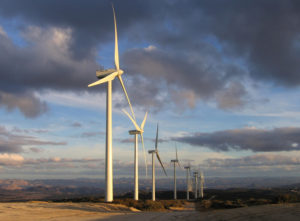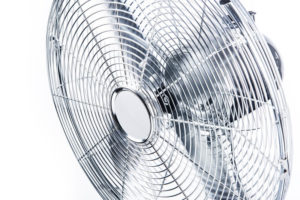Beauty might be in the eye of the beholder, but whether noise is “white” seems to be in the ears of the listener!
Some people put a fan on to sleep. Some go out and buy a white noise machine. Others have no use for either device.
According to some people, some white noise isn’t so “white.” It isn’t bland, and it doesn’t stay in the background.
Bottom line: before spending money on a white noise sound machine because you’ve heard it will help you sleep, it might be a good idea to listen to some for a while to find out if you’re bothered by it.
In addition, try to get a machine that allows for noise in different frequencies and works at different volumes. When weighing complaints about the white noise present in some backgrounds, flexibility is key when it comes to using the machines as a sleep aid.
Uncontrollable white noise seems to give all white noise a bad name.
White noise in the background
Take white noise coming from wind turbines.
Many people who live near the turbines would say, “Yes, take that noise away. Please!”
Perhaps the perception of the turbines’ noise might be because people find them an eyesore on the skyline.
Or maybe they really are sensitive to the sound of the turbines.

Either way, they stir a visceral reaction in many.
The effect of the sounds coming from wind turbines has been studied extensively. Because the issue can be so contentious, it’s hard to trust the conclusions one way or another. Some studies conclude turbines don’t do anything to harm sleep. Other studies and people who live near them claim otherwise.
It’s hard to tell who’s telling the truth, who’s lying, or who has a skewed perception. Videos readily available on YouTube have a soundtrack of this awful, whirring repetitive noise. Yet we who don’t live anywhere near the turbines shouldn’t accept it as proof in and of itself. Videos can be doctored.
Many of us have stood near wind turbines. Many have said they don’t hear a thing. Others do hear something.
If you don’t hear anything, it could be because the day doesn’t have enough blowing wind to make the turbine make any noise. On the other hand, it could be some people aren’t sensitive enough to the sound due to some aspect of their physiology.
It also could be that the turbines are so ugly to some people they’re going to manufacture complaints, at least that’s the charge.
GE states the noise coming from a wind turbine is equivalent to an air conditioning unit.
A 2019 study conducted to examine the effects of actual air conditioning unit noise on sleep revealed there was no significant effect.
Renewable energy is important. Beyond global warming, from a national perspective, a diverse energy supply makes strategic sense. Still, ruined sleep from wind farms can be construed by rural residents as another thing shoved down their throats by oppressive city dwellers.
Every place has its advantages and disadvantages. City dwellers would have their complaints about the sound of traffic and the other noises accompanying living close to other people.
More than one urban resident has visited a relative who lives in the country and found they couldn’t sleep with the silence, the crickets, or the croaking frogs.
The country cousin has gone into the city and wondered to himself, don’t people here ever stop driving around?
That especially happens in downtown Manhattan, “the city that never sleeps.”
White noise machines
Yet all repetitive noises aren’t bad for sleep. You have ceiling fans and other fans sitting on dressers. They send a continual breeze around the bedroom.
When they want the noise without the breeze (and let’s face it — a constant cold breeze can be miserable at certain times of the year or if the air conditioner is turned down too low), they go out and purchase white noise machines.
The fan, of course, can be pointed toward a wall. The wall can do much to dissipate the breeze from the device.
The white noise machine, however, can provide a greater range of frequencies. It also is easier to use than hooking up speakers and playing a sound file on some speakers.
The noise machines are good for babies, for people who want to drown out a snoring spouse, for people who have apartments with thin walls, or even for old dogs who bark randomly during the middle of the night. Product reviews are full of people singing their praises. A dedicated white noise machine can give you the flexibility you don’t get from a fan.
If you’re living in a densely populated area, a white noise machine can help salvage that last precious bit of sleep after those who get up at a different time start stirring.
They’re best thought of as an alternative to sleeping with earplugs. Those things mimic symptoms of congestion.
Both devices are great for people who work the night shift. Everybody else is awake during the day. There’s noise from time to time. It helps friends and family not have to encounter the disturbed bear.
While the machines don’t always drown out the noise intrusions, they do complement them. They aurally color the sounds allowing the individual to sleep undisturbed.
Hospital critical care units can be full of these random, disruptive noises. A 2016 study from Iran showed a white noise machine could be beneficial for drowning out those noises, helping those patients sleep better.
With all of the beeps and chirps on critical care equipment, there’s a lot of noise to drown out.

Sometimes, after months of functioning, part of the machine loosens, and it starts making a disconcerting racket. Then the machine must be tightened or lubricated.
Be sure to save those instructions!
A fan can also be helpful for sleeping, ceiling, or dresser top.
It’s designed with the primary purpose of cooling, though the noise frequency that’s generated might be useful for sleeping, too
This can be part of your arsenal for ensuring you get a good night’s sleep.
Beyond that, remember that how you react to your environment shapes your feelings. If you hate wind turbines, be sure you’re separating how you feel about their appearance from the actual sound they make.
Is white noise bad for you?
The answer isn’t clear.
It is uncertain whether white noise is detrimental to one’s health. While some individuals may experience discomfort upon hearing it, research indicates it doesn’t interfere with sleep. Some people rely on white noise-generating appliances to assist them in falling asleep. Other elements may contribute to the situation.
White noise phone apps
If you’re on the road and miss your white noise machine, you may want to consider downloading a white noise app on your Android or Apple phone. White noise apps can be helpful in blocking out distracting noises you might find in some lodging.
Many of these apps come with various soothing sounds, such as ocean waves, raindrops, and even calming music. You can choose from a selection of different sounds and adjust the volume to your liking. Some apps also allow you to set a timer, so you can drift off to sleep without worrying about turning the sound off.
Two such apps are Rain Sounds – Sleep Ambience and Sleep Aid Fan – White Noise.
Have you ever experienced trying to sleep near an operating wind turbine? Do you sleep with a fan or a noise machine? What do you think about it? Comment below.
For Further Reading:
Here are some secrets to sleeping near a noisy, busy street
Speak with your wallet and forget about it at bedtime
Afshar, P. F., Bahramnezhad, F., Asgari, P., & Shiri, M. (2016). Effect of White Noise on Sleep in Patients Admitted to Coronary Care. Journal of Caring Science, 5(2), 103–109.
Alkahtani, M., Alshathri, N., Aldraiweesh, N., Aljurf, L., Aldaej, L., Olaish, A., Nashwan, S., Almeneessier, A., & BaHammam, A. (2019). The effect of air conditioner sound on sleep latency, duration, and efficiency in young adults. Annals of Thoracic Medicine, 14(1), 69.
Lane, J. D., Bigelow, P. L., Majowicz, S. E., & McColl, R. S. (2016). Impacts of Industrial Wind Turbine Noise on Sleep Quality: Results From a Field Study of Rural Residents in Ontario, Canada. Journal of Environmental Health, 79(1), 8–12.
Micic, G., Zajamsek, B., Lack, L., Hansen, K., Doolan, C., Hansen, C., … Catcheside, P. (2018). A Review of the Potential Impacts of Wind Farm Noise on Sleep. Acoustics Australia, 46(1), 87–97. https://doi.org/10.1007/s40857-017-0120-9
Seltenrich, N. (2014). Wind Turbines. Environmental Health Perspectives, 122(1), A20–A25. https://doi.org/10.1289/ehp.122-A20
Other posts you may be interested in:
Here are some secrets to sleeping near a noisy, busy street.
Is it good to wear hats while sleeping?
How and when to use Benadryl for sleep.
Is bedtime a good time for self-improvement?
James Cobb RN, MSN, is an emergency department nurse and the founder of the Dream Recovery System. His goal is to provide his readers with simple, actionable ways to improve their health and maximize their quality of life.
The DRS uses affiliate links. We may receive a commission if you click on a link and make a purchase. The arrangement has no effect on our opinions.
Updated Jan. 23, 2023

I have been surfing online more than 3 hours today, yet I never found any interesting article like yours. It’s pretty worth enough for me. In my view, if all site owners and bloggers made good content as you did, the net will be much more useful than ever before.